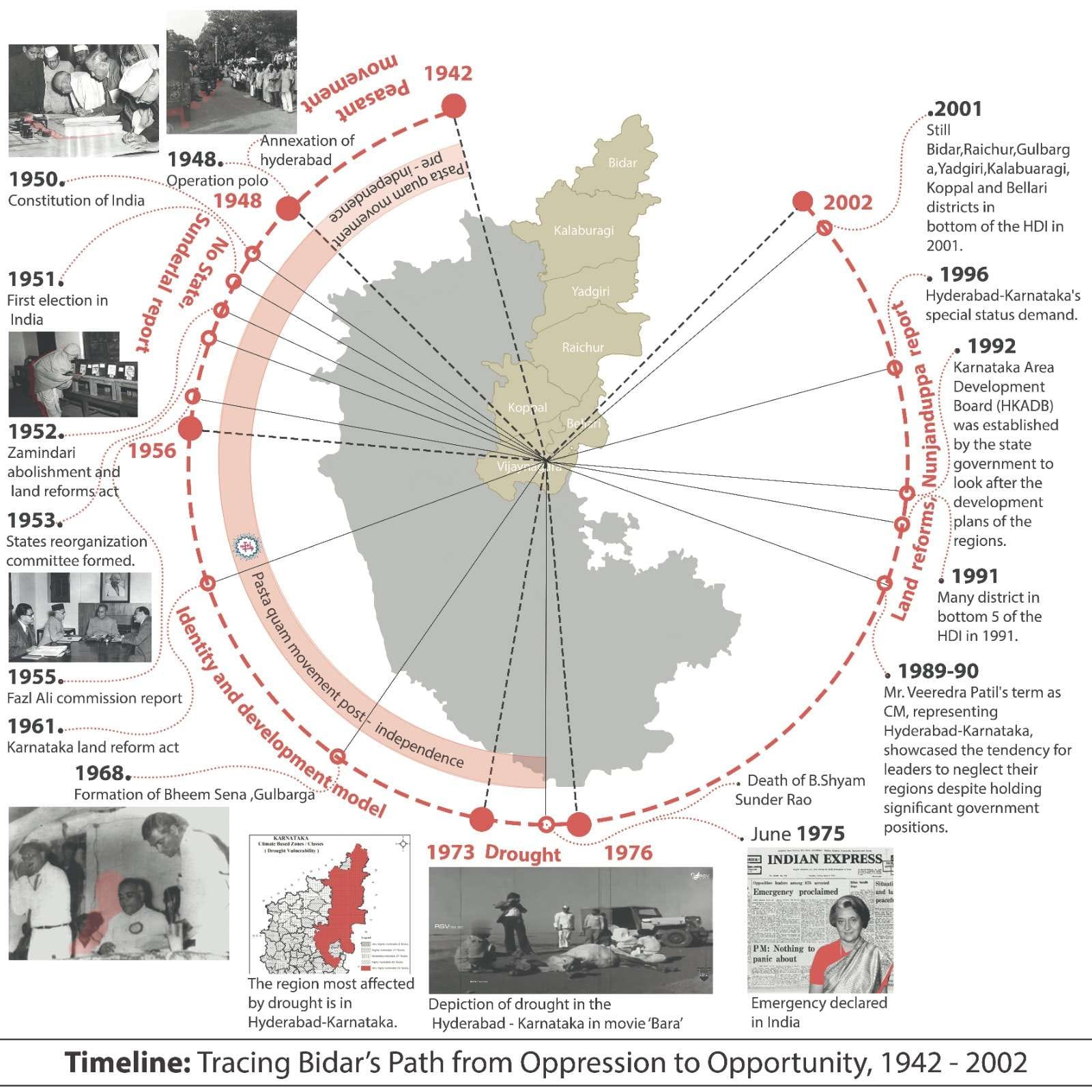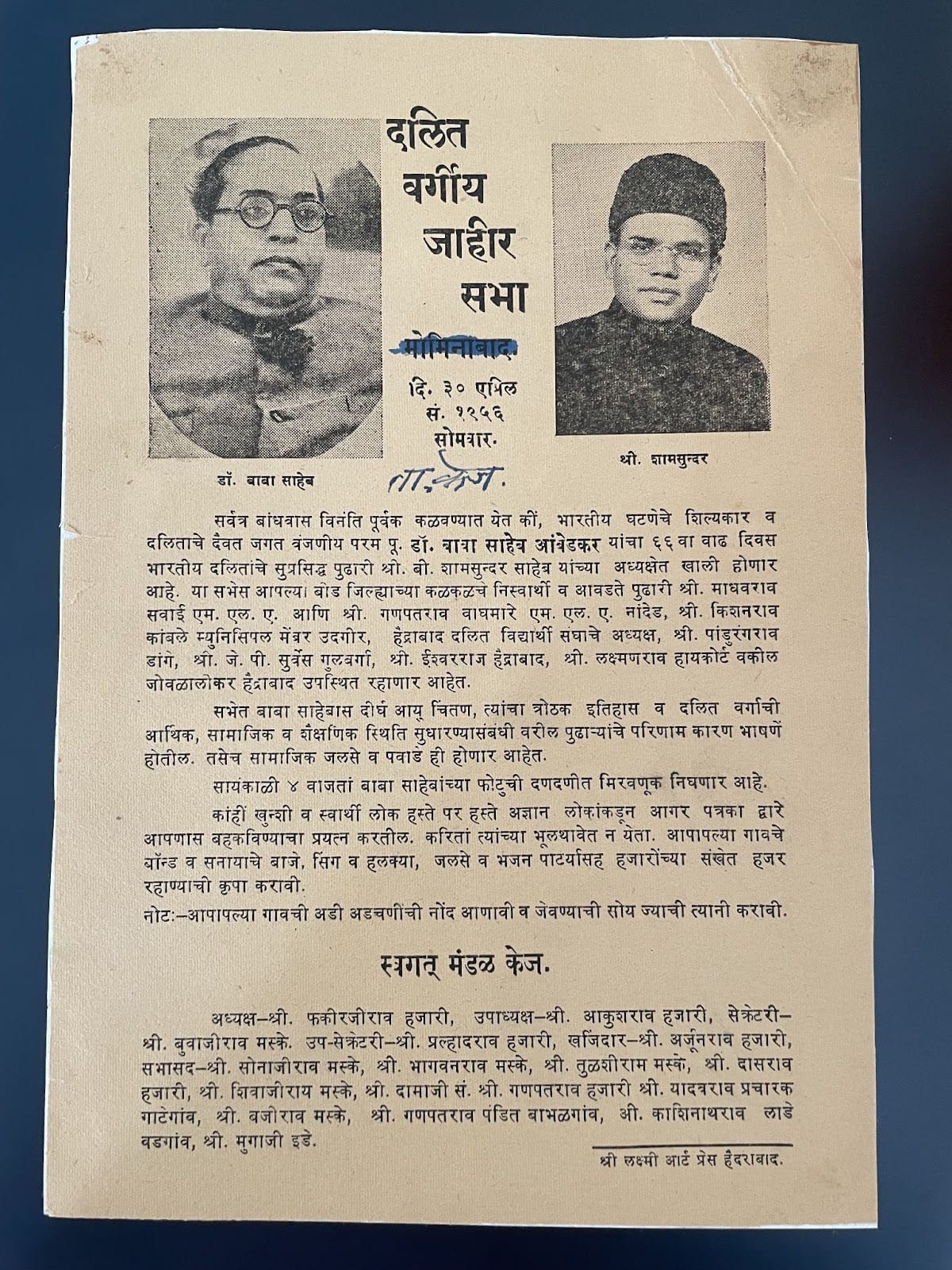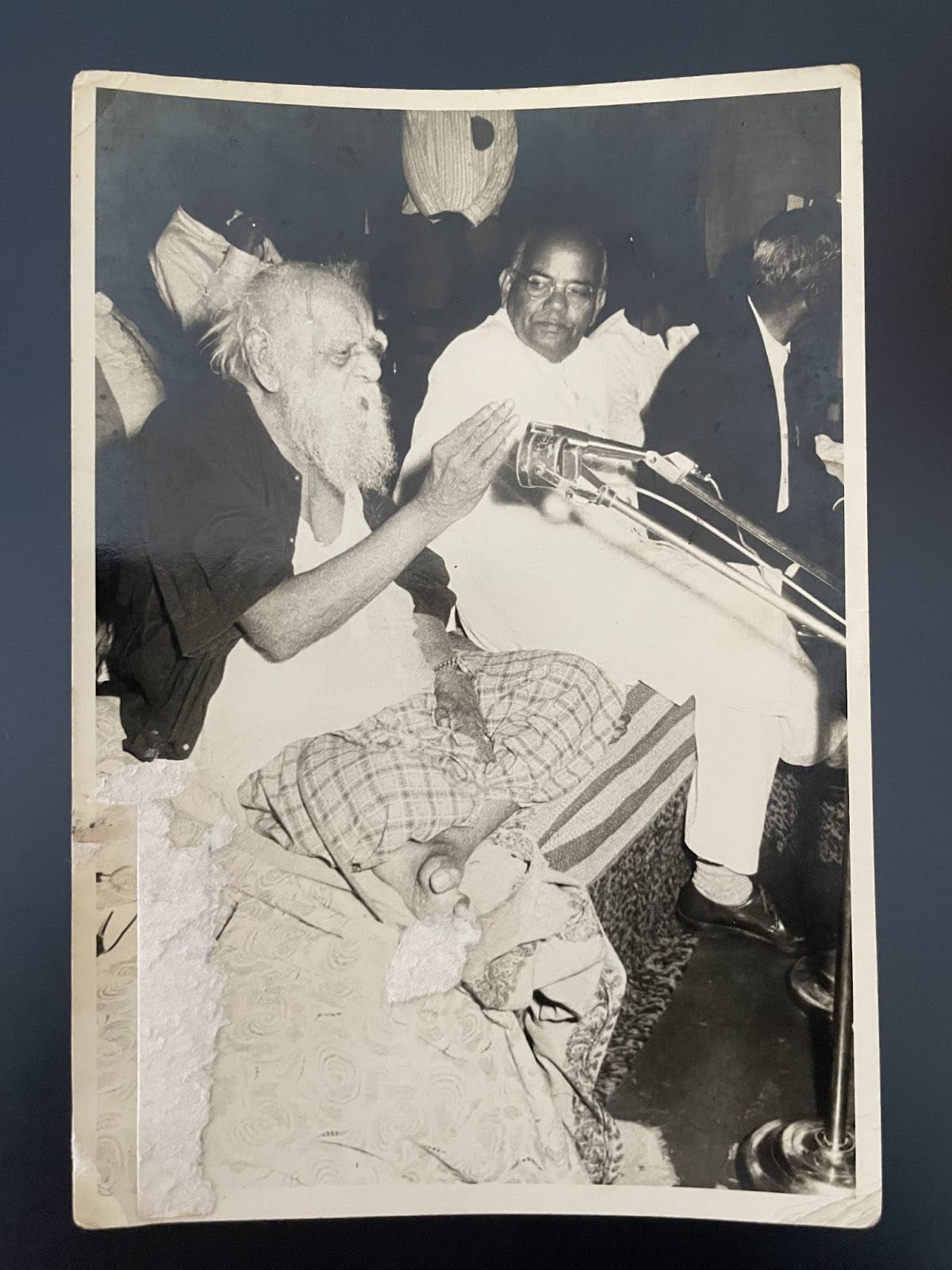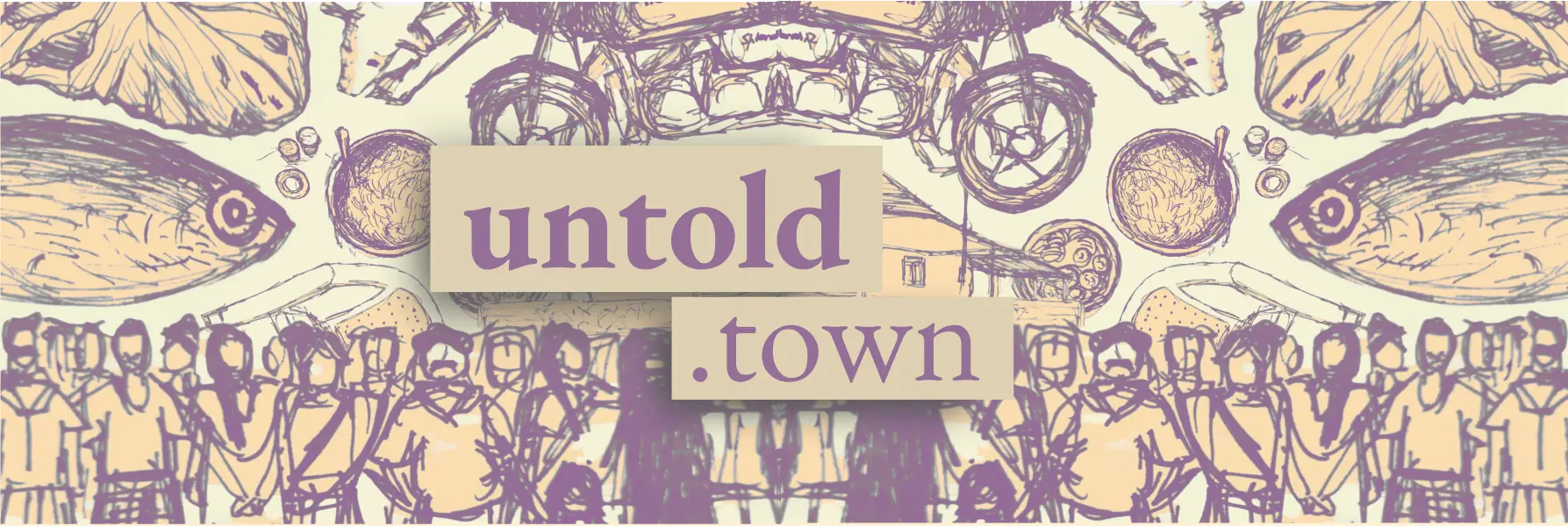Social Movements in Hyderabad Deccan

Our archival practice has recently expanded to encompass the socio-political and cultural histories of the Hyderabad Deccan, with a continued focus on the Hyderabad Karnataka region. This expansion seemed apparent once we recognised the archival silences surrounding people-led movements during learning facilitation of Capstone and Directed Research Projects with post-graduate students, particularly those advanced by Dalit, Bahujan, Adivasi, and Minority communities. Our place-based archival practice reassess dominant historiographical paradigms by systematically cataloguing and archiving artefacts, oral histories, and personal archives that unveils the political agency, resistance and reforms demanded by the subaltern groups in the region.
Hyderabad-Karnataka region has been the origin for several social reform movements and receptive to other such movements that spread from the surrounding regions. We prepared a timeline that helps to locate significant moments that shaped the Hyderabad Karnataka region. The first collection situated within the archive of Social movements of Deccan belongs to the depressed class movements, with the funding support of MEAP grants 2024-25.

Revisiting the legacy of Mool Bharathi Battula Shyam Sundar and the depressed class movements
A common factor in all the movements between the 1930s to 1970s in Hyderabad Deccan region is B Shyam Sundar (1908-1975), a scholar, politician and social activist who later came to be known as the ‘Father of Dalit Movements’. B Shyam Sundar, a multifaceted personality - a jurist, a fierce political orator, an able parliamentarian, an editor, and a leader of depressed classes in the Deccan, is recognised for his intellectual prowess for human rights struggles, and pragmatic contributions to social movements on the issues of caste, class, gender, and development. He was born as an untouchable himself, who saw indignities and humiliation of his fellow communities, and dedicated his life towards the upliftment of the oppressed. The history of the movements and organisations supported by B Shyam Sundar have been lost in the complex evolution of Dalit movements in India, and it remains in the personal collection of his allies and supporters, who are living in places and regions he actively worked before his demise in 1975.
1935-48 : Fasth-e-Kahome (translates to Movement of the depressed classes)
1937-1970s: Dalit-Muslim Unity Movement
1968-1975: Bhim Sena Movement
Post 1980’s (After demise of Shyam Sundar) events and movements
The collections represent the political leaders, grassroots workers, activists and social justice crusaders of depressed class communities in Deccan. Making of such a collection is particularly significant as it addresses the urgent need to preserve the works of B. Shyam Sundar, whose contributions have largely faded from public memory. Despite his pivotal role in depressed class movements of the region, his writings and collections remain scattered and inaccessible in public. Our archival engagement aims to systematically document his extensive body of works spanning four decades, ensuring its preservation and further circulations. In the future, we will carryout survey and catalog of place-based archival collections pertaining to a series of movements led by the depressed classes (Dalits, Bahujans, Minorities and Adivasis) demanding land reforms, right to education, dignity of life and right to remain free from the caste-based discrimination such as untouchability between 1940 to 1980s.
Chronology and Thematic Scope of Social Movements (1935–1980s)
In the current round of survey our focus will be on the Fasth-e-Kahome (Depressed caste) movement, the Dalit-Muslim unity and socio-cultural movements, the Bharatiya Bhim Sena and other various socio-political justice movements and events of the Dalits (previously called untouchable, now categorised under schedule castes), Backward classes (BCs), minorities- Muslims and Christians, and their struggles, and achievements for self-respect, civil rights politics. The survey will reflect the prevalent religious emancipatory politics, the uprising of Neo-Buddhism, the grassroots Bhim sena cadre works, and the Mool Bharathi discourse, and diverse self-identification, assertion moralities of the depressed classes. They also divulge through personal writings, movement based daily’s, weekly’s, and tabloids.

The work, covering different materials, are chosen due to its rarity, and immense historical and social significance. It represents a rare perspective in Indian history, challenging dominant narratives and offering a nuanced understanding of anti-caste movements, grassroots activism and reforms in the region. The works of B.Shyam Sundar and other leaders, are not in circulation or substantially published. We want to remember and make available the shared memory of B Shyam Sundar and his works that have been erased from the memory of the people in the Deccan region. In the current socio-political context we need to propagate the works of the grassroot leaders from the region so that the connection towards the people's movement is rebuilt and reimagined.
Place-based archiving methodologies and Material Typologies
Given the vast and fragmented nature of these fragile collections, we are carrying out extensive surveys to locate the collections and prepare a detailed inventory. This effort will ensure that the legacy of the movements continues to inspire and inform contemporary discourses on social justice and equality across the globe, while also addressing the gaps in regional history and scholarship. The archive strengthens the knowledge of anti-caste movements led by B. Shyam Sundar and others, encompassing the efforts of depressed class groups in the Deccan region. Our archive is among very few works that reflect the state of affairs in the Hyderabad Deccan spanning pre- and post-independence concerning depressed class groups, their cultural narratives and political engagements, beyond regional boundaries. Hence, the outcomes will outline a timeline of the micro-history of regional cultural plurality, people’s struggles and movements, and the linguistic syncretism in the region.
We put together ethical guidelines for place-based archival practice, developed for the Modern Endangered Archives Programs (MEAP) focusing on Social Movements of Hyderabad Deccan. It presents a framework that goes beyond traditional rights-based approaches to include the right to refuse, emphasizing that the ethics-in-practice should remain a space for ongoing negotiation. We will publish this soon on Untold Town.
Constructing collection around social movements is vital for rebuilding and reimagining political movements in the contemporary times. Co-imagined as a resource for the current and future generations,to learn about local leaders and build movements that reflect contemporary necessities. The struggle for human rights is important to remember and learn from, to continue to fight for social justice by the people in this region. For us social movements too are critical heritage of the communities and the people of the Hyderabad Deccan region. We want our effort to ensure the voices of the oppressed, suppressed, and depressed classes are remembered and integrated into the broader discourse on India’s democratic and egalitarian struggles.

The materials and artefacts in our collection is necessary to redefining historical studies, capturing the intellectual, cultural, and moral values of leaders and movements, emphasizing their interlinkages with anti-caste struggles, rights over culture, institutions, land, and resources, and addressing gaps in Deccan regional politics and its intersectional dimensions. Useful in filling the historical gaps, linking the nuances around the social and political development of the region, unpacking various regional experiences and cumulative effects of various political strings and intersectional dimensions to becoming a backward region in the newer states post devolution of Nizam state.
Scholars and doctoral researchers from the Bahujan communities in various disciplines of Social Sciences and Humanities have been researching their own histories and leaders. The outcome of this work can become a unique resource for several studies to be formulated, to the worlds of academia, political class, progressive groups and the wider civil society- to critically engage with the issues, ideas, and perspectives it brings forth and also further build on them. This work will act as a catalyst where people will get to know their histories and regions histories, movements and struggles, which happened for the upliftments of Bahujan and minorities communities. As B Shyam Sundar initiated Bahujan politics and movements, he became a major contribution to Bahujan politics after his Demise. It will also inform the collectivisation of the cadres in the regions where these social movements and the veteran activists are still residing. We can see many Bahujan movements being led by youths/students, many of these students/youth groups are not aware of the works of B Shyam Sundar, who started his political career by being a student. It will foster a deeper understanding of the region’s democratic struggles and their relevance to contemporary discourses on social justice and equality.
Expanding the archival cartography
The Bidar Heritage Centre (BHC) is conceived as a dynamic, community-driven institution that reimagines the idea of what a museum can be. Unlike traditional museums that preserve collections curated by experts and restricted with copyrights, BHC focuses on the living social, cultural, institutional and most of all ordinary history of Bidar. The centre is imagined to foster active public engagement by allowing residents to remember, reconnect and interpret their local histories and legacies. By emphasizing local collectors and storytellers in three sub-archives as ‘Archive of Community Narratives, ‘Archive of Police History,’ and ‘Archive of Citizen Curators,’ BHC democratizes heritage-making and archives community memory through people’s narratives. It serves as a resource hub for local scholars, residents and universities, encouraging collaborative research and knowledge exchange. BHC in its ambitions reflects to be a learning museum, through community participation becoming a shared space for evolving histories.Building on these efforts, BHC is expanding its collections to include the Social-Political and Cultural histories of the region.
The project on social movements in Hyderabad Deccan with current focus on Hyderabad Karnataka region seeks to illuminate and preserve the rich legacy of people-led movements in the Deccan. We aim to survey and catalog artefacts that unveil the efforts of depressed class groups, particularly Dalits, and Minorities to shed more light on the cultural and political histories of these communities attached to the progression of the region.
We request the general public to reach out to us with any information, connections, and collection details pertaining to the project. Email us at- [email protected]
